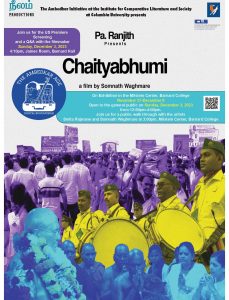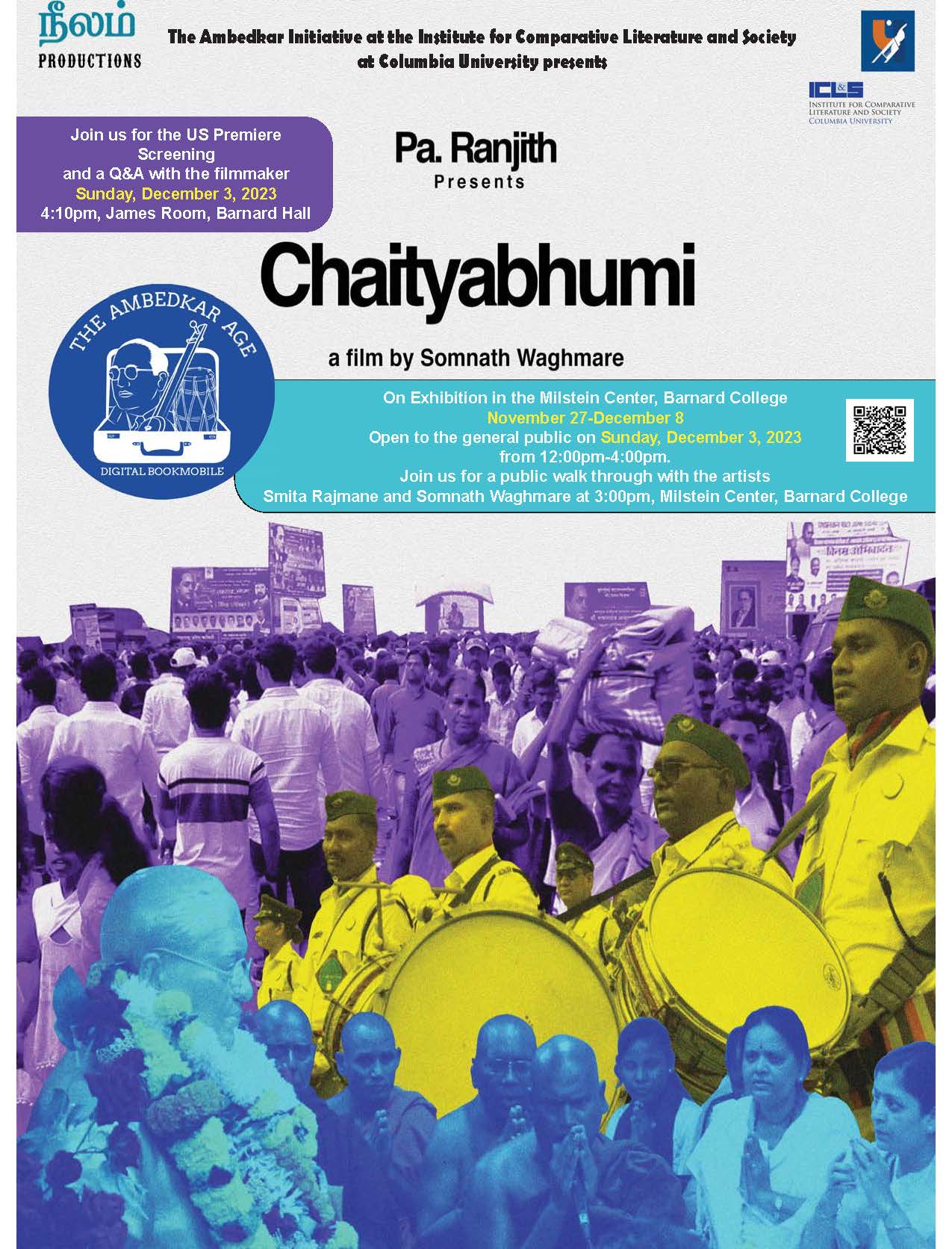Ambedkar Age Digital Bookmobile Exhibition and US Premiere of “Chaityabhumi”

The Ambedkar Initiative at ICLS presents the US debut of the The Ambedkar Age Digital Bookmobile and the film “Chaityabhumi.” Artist Smita Rajmane and filmmaker Somnath Waghmare will visit Columbia University and Barnard College. The exhibition of The Ambedkar Age Digital Bookmobile will be on view in the Milstein Center from Nov 27-Dec 8, 2023. Public Access to view the exhibition will be on Sunday, Dec 3, 12pm-4pm. Registration details for the public can be found here. At 3:00pm on Sunday, Dec 3, Smita Rajmane and Somnath Waghmare with host an artist walk-through the exhibit, sharing stories of the images and video. This walk-through will be followed by a screening of the film “Chaityabhumi” with a Q&A with the filmmaker, Somnath Waghmare at 4:10pm in the James Room. Registration for both events is here.
Project description
The Ambedkar Digital Bookmobile is a project conceived by public intervention artist, performer, and educator Smita Rajmane and documentary filmmaker Somnath Waghmare. It aims to collect Maharashtra’s long history of social reform, accessing 400–500-year-old traditions of songwriting, performances, and poetry against caste-based exploitation and untouchability. It is a history that speaks with multiple voices ranging from Saint Tukaram, Saint Chokhamela and Vamandada Karadk to contemporary, popular singers like Adarsh Shinde. The project seeks to document singers and artists who mostly hail from rural interiors and are not very well known around the urban spaces of Maharashtra. The singers have been singing anti-caste songs for many decades. Every year they perform at different gatherings such as the one held at Chaityabhumi Dadar on the occasion of Ambedkar’s death anniversary observed as Mahaparinirvan Din on the 6th of December, Deekshabhoomi Nagpur on the 14th of October, Bhima Koregaon on the 1st of January, Mahad on the 20th of March, etc. Through documentation of these embodied histories of anti-caste resistance, the project seeks to raise awareness around contemporary Dalit popular and political song-performances within the community. With the aim of encouraging discussion and dialogue, the bookmobile will travel to a variety of public spaces including educational institutions, community halls, gardens, and libraries in both urban and rural areas. Imagining the ‘digital bookmobile’ as a portable multimedia archive with the potential to navigate distances and cultures of resistance with economical means, Smita and Somnath hope to catalyze new avenues of understanding and meaning around the documentation of ephemeral elements of performance, songs, and poetry. Bookmobile has been invited and displayed the archive in 12 public places and educational institutions. This will be its first public display in the United States.
The trailer of the Chaityabhumi film
Brief about the film
Mumbai or Bombay as it is known today, has always been a city of dreams, drawing millions of migrants from all corners of India. It is a city of hope, where people come seeking a better life. However, Mumbai also has a long history of social struggle, reflecting the challenges and inequalities faced by its diverse inhabitants. This bustling metropolis is not only a melting pot of cultures but also the center of the Hindi film industry, Bollywood. For the Dalit movement in India, one of the most significant places is Chaityabhumi in Mumbai. This holy site holds great importance, as it is where Dr. Babasaheb Ambedkar’s last rites were performed after his passing on December 6, 1956. Dr. Ambedkar, often referred to as the father of the Indian Constitution, dedicated his life to fighting against the chains of caste oppression. He was a guiding light for the oppressed, dismantling discriminatory barriers and empowering them to reclaim their rightful place in society.
The Dalits, also known as the Untouchables, find themselves trapped within an unjust social order. Caste, a deeply ingrained system, categorizes society into hierarchical divisions based on birth. Dalits are relegated to the lowest rung, labelled as impure and untouchable. They face relentless discrimination, enduring daily humiliation and the denial of basic human rights. This cycle of oppression has persisted for centuries and continues to this day. Mahaparinirvan Din, the day of Dr. Ambedkar’s departure, holds immense significance for the Dalit community. Every year from December 1 to December 6, millions of Dalit-Bahujans from across the nation make a pilgrimage to Chaityabhumi in Mumbai. They stay close by, at a sprawling public park called Shivaji Park and spend close to a week in the city. Most of them are landless Dalit laborers, who travel in passenger trains with just a pair of clothes and dry food packets. Many Nepalese e “and Sri Lankans visit Chaityabhumi. This week-long commemoration is a heartfelt tribute to their revolutionary leader, a time to honor his memory and the profound impact he has had on their lives. It is a powerful symbol of their ongoing struggle for justice and equality, a day when their hearts beat as one, united in their unwavering resolve to carry forward Babasaheb’s legacy.
During this time, the Ambedkar memorial Chaityabhumi in Mumbai’s Shivaji Park transforms into a vibrant hub of activity. It becomes a cultural festival, where books are sold and purchased, music fills the air, and performances take place. However, amidst the reverence and celebration, there is also a sense of disdain from the city’s media and elite. This documentary film seeks to illuminate the history and cultural politics behind the commemoration of December 6 at Chaityabhumi, shedding light on its significance in contemporary India. The film delves into the tensions that arise from the intersection of caste and the public sphere in Mumbai. It explores how this peaceful event is viewed and received by different segments of society, bringing to the forefront the complexities of caste dynamics and the struggles faced by the oppressed in their quest for social justice. Through interviews, personal stories, Music and evocative visuals.
This documentary film will bring to light the history and cultural politics of how people commemorate December 6 at Chaityabhumi and what its relevance is in contemporary India. This documentary film will bring to light the history and cultural politics of how Dalit mass commemorate December 6 at Chaityabhumi and what its relevance is in contemporary India. Also this film explores the caste and public space politics of Mumbai city.









